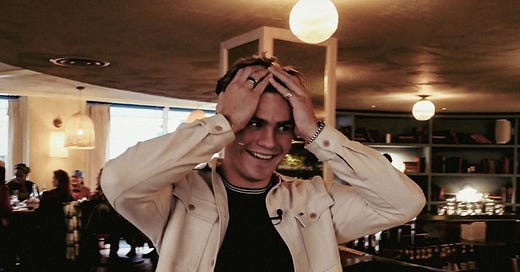A new magic trick is released and the comments say things like…
“But you have to take the phone back.”
“But you have to switch the deck.”
“But they can’t really choose ANY card.”
Uhhh, yeah. Of course. It’s not real magic.
Comments like that expose a very real paradox with magicians.
Let me explain…
I’ve been selling “methods” to magic tricks since I was 19 years old. I’m 33 now.
In that time, one thing always stands out to me. That some magicians get disappointed in the “method” of a trick.
Sometimes in the restrictions
Sometimes in the level of practicality
…and sometimes in the simplicity of the method.
It creates a paradox, that the people most disappointed in the effect are the ones performing it.
Over time, that inevitably creates contempt.
THE PURSUIT OF REAL MAGIC
We are, admittedly or not, looking for real magic.
We are looking for the “perfect” method. The best solution. The trick without flaws.
Whether they know it or not, many magicians focus on the restrictions of a method and forget the ‘effect’ for an audience.
They may write negative comments against a release - to deter others from buying or performing it. But they forget the subjectivity of what a s**t method is.
IS THERE SUCH A THING AS A BAD METHOD?
Thomas Sowell has a great quote:
“There are no solutions, only trade-offs”
I think it applies to magic nicely.
Gimmicked deck? It requires a deck switch to make it examinable. That’s the trade-off.
Super-simple method? It’s more open to exposure. Trade-off.
Impromptu effect? Often a gimmicked version is more visual. Trade-off.
Gaffed coin? Can’t be inspected & expensive to buy. Trade-off.
Assuming it works, every magic effect has a trade-off. Whether it’s pocket space, practicality, cost, audience management, skill etc.
But does a trade-off affect the effect? Say that 3 times fast. Affect the effect.
What I mean by that is… Does the trade-off diminish the effect for an audience?
To sleeve a coin you need to wear sleeves. But is the effect the audience experiences worse because you’re wearing a jacket?
That answer is going to be different depending on which magician you ask. It’s entirely subjective.
But let’s pretend your answer is “YES.”
Now ask yourself… Are you answering for you, or your audience?
Because in our pursuit of real magic, we forget that what may be obvious to us, absolutely kills with laymen.
I did the ketchup vanish (using a napkin) for my wife’s cousin and it blew his mind. Many would consider this a child’s trick. A level beneath them.
And if I sold that effect as a download, with genuine reactions in the trailer, you’d see comments like…
“Liars. It’s not really vanishing. It’s in his lap… You need a lap to do this!
Didn’t see the word lap in their trailer. That’s disingenuous.Also it’s sad that you have to sit. I don’t always sit when I perform. Sometimes I stand to engage more with my audience. If it could be done for us standing folk, you’d have my money…. But this sucks!”
That’s satire, but it’s not far from the truth.
It’s just there to demonstrate that a trick isn’t necessarily terrible because you don’t like the trade-off within the method.
CHOOSE YOUR TRADE-OFF WISELEY
I don’t carry a card index anymore, I like to keep my pocket space for a real deck. It doesn’t mean indexes aren’t good. It’s just I value pocket space over the effect an index can produce.
I believe I can create that same effect for an audience with a top palm… or a single envelope in my wallet.
Some people may value choice instead - and they’re happy to lose pocket space to get more choice with an index. That’s their trade-off.
Neither method is worse if the audience’s perception of the ‘effect’ is the same.
Do you agree? Disagree? Let me know in the comments below. I personally read each one and love to see if you’re finding this content valuable.





This is a great and very relevant post. My take on it is this:
IF... a trick can fool and entertain a real life audience then (and only then...)
Restrictions:
They don't make a trick bad. They may make it not for you, but not actually bad
The level of practicality:
You just have to weigh up is it worth the effort and practice to you personally. If it isn't, That doesn't make it a bad trick, it is just makes it not a trick for you.
Simplicity of the method:
This is the big one for me. Sometimes I am disappointed by the simplicity of the method. I have seen an amazing trick and it comes down to something so simple...
I am disappointed because I have seen the impossible but the secret is so possible and dull by comparison.
But... this means that I can recreate that trick by doing something simple. Make the audience see that magic, feel what I felt when I first saw it, by doing something simple. These are the tricks I seek out. These are the tricks that fill me with joy - eventually once I have got over the disappointment!
The first thing we often do when a new trick comes out is ask "what can't we do with it" instead of "what can we achieve with it", so we're already playing a losing game with ourselves, as seen by our drawers full of unused magic.
The audience doesn't know about our trade offs, but you're right, we all have to decide what we value in our own magic.